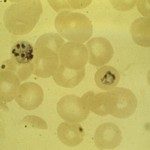Link to Pubmed [PMID] – 28306665
Link to DOI – 10.1097/MOH.0000000000000334
2017 May; 24(3): 208-214
Malaria parasites invade and multiply in diverse host cells during their complex life cycle. Some blood stage parasites transform into male and female gametocytes that are transmitted by female anopheline mosquitoes. The gametocytes are activated in the mosquito midgut to form male and female gametes, which egress from RBCs to mate and form a zygote. Here, we will review our current understanding of the molecular mechanisms that mediate invasion and egress by malaria parasites at different life cycle stages.A number of key effector molecules such as parasite protein ligands for receptor-engagement during invasion as well as proteases and perforin-like proteins that mediate egress have been identified. Interestingly, these parasite-encoded effectors are located in internal, vesicular organelles and are secreted in a highly regulated manner during invasion and egress. Here, we will review our current understanding of the functional roles of these effectors as well as the signaling pathways that regulate their timely secretion with accurate spatiotemporal coordinates.Understanding the molecular basis of key processes such as host cell invasion and egress by malaria parasites could provide novel targets for development of inhibitors to block parasite growth and transmission.

